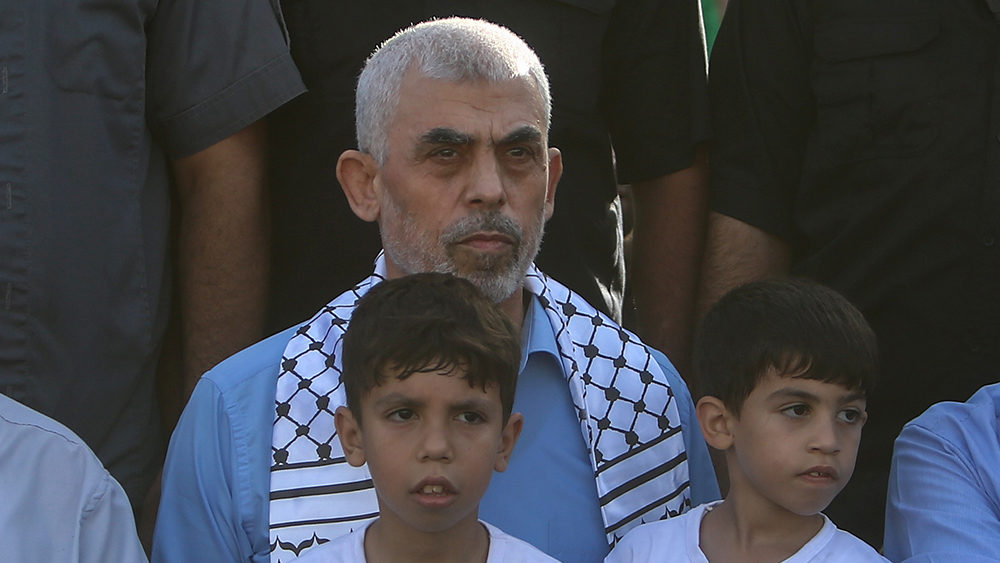Hamas official: Group’s resistance to Israel WILL CONTINUE despite killing of Yahya Sinwar
Hamas’ resistance to Israel will continue even though Israeli forces succeeded in killing its leader Yahya Sinwar.
Basem Naim, a senior member of Hamas’ political wing, reiterated this stance during an interview with the Middle East Eye (MEE). He said the killing of Sinwar, 61, will not deter the Palestinian people from resisting Israeli occupation and fighting for their “freedom and dignity.” While it was “distressing to lose beloved people,” Naim remarked that it did not mark the end of the Palestinian movement.
“It seems that Israel believes that killing our leaders means the end of our movement, and [the] end of the struggle of the Palestinian people. They repeated those same statements when they killed Sheikh Ahmed Yassin and Abdel Aziz al-Rantisi,” said Naim, mentioning two of Hamas’ founders assassinated by Israeli forces in 2004. “But each time, Hamas became stronger and more popular. Hamas is a liberation movement led by people looking for freedom and dignity. This cannot be eliminated.”
Two Jordanian pundits who spoke to MEE also shared Naim’s sentiments, political analyst and political science professor Amer al-Sabaileh being one of them. According to him, Hamas as both a political and military force has survived the assassination of multiple leaders over the decades – and this latest killing should not be seen as a death knell for the group.
“Sinwar’s death will not affect the level of fighting in Gaza,” he said. “Perhaps the resistance will move to a state of disorganized decentralization, and this could prove difficult for the Israelis to control.”
Meanwhile, military expert and retired Maj. Gen. Mamoun Abu Nowar told MEE: “Hamas will be affected for a short period at the leadership level. But the group represents an idea and an ideology that does not end with the death of one person.”
Sinwar killed in IDF operation
Sinwar first came to prominence in 1985 when Yassin appointed him as a co-leader of the Majd organization that weeded out Israeli collaborators. In 1988, Sinwar – then 26 – was arrested and sentenced to four life sentences for orchestrating the abduction and killing of two Israeli soldiers as well as the execution of four Palestinians suspected of cooperating with Israel.
He spent 22 years in an Israeli prison and was only freed in 2011. Sinwar was released along with more than 1,000 Palestinians in exchange for Israeli soldier Gilad Shalit. Sinwar rose through the ranks until he was appointed the group’s leader after the July assassination of Ismail Haniyeh in Tehran. (Related: Iranian analyst warns of harsher response to Haniyeh’s killing than previous strike on Israel.)
Sinwar was killed on Oct. 16 during an encounter with units of the Israel Defense Forces (IDF). Israeli soldiers encountered several militants, with the Hamas leader reportedly among them. The militants split up, with Sinwar entering a partially destroyed house.
Footage released by the IDF showed Sinwar flinging a stick in the direction of an approaching drone. The Israeli army subsequently shelled the structure where the Hamas leader was taking refuge, killing him in the process. Israeli officials confirmed his death on Oct. 17, while Hamas confirmed his demise on Oct. 18.
The IDF’s drone video went viral on social media. It was accompanied by quotes from Sinwar’s past speeches, where he reiterated that he would rather die in battle than surrender.
On Oct. 19, the Israeli military dropped leaflets in southern Gaza that featured an image of the dead Hamas leader. “Sinwar destroyed your lives. He hid in a dark hole and was liquidated while escaping fearfully,” the leaflets read.
The Lebanon-based Hezbollah, a close ally of Hamas, vowed to escalate its fight with Israel after Sinwar’s death was confirmed. The Islamic Republic of Iran, which backs both Hezbollah and Hamas, said Sinwar’s demise would strengthen regional “resistance” to Israel.
Watch this footage of the last moments of Yahya Sinwar before his death at the hands of Israeli forces.
This video is from The Prisoner channel on Brighteon.com.
More related stories:
Hezbollah’s “initial” response to assassination of top-ranking Hamas leader involved striking Israeli intelligence base with more than 60 rockets.
Israel’s assassination of Hamas leader Haniyeh in Iran signals Netanyahu’s willingness to escalate conflict into full-scale regional war.
Hamas commander involved in October 7 attacks killed during an Israeli airstrike.
Sources include:
MiddleEastEye.net
Brighteon.com
Read full article here


